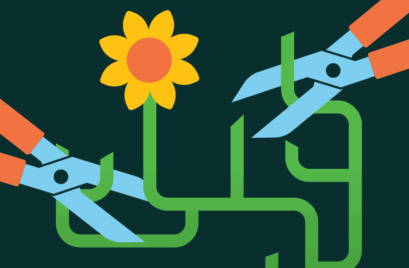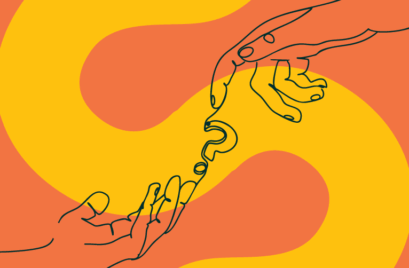
The world has reached a crisis point.
We are confronted with study after study describing the looming catastrophe of our inaction on climate change. Resignations continue to hit all major industries as people search for ways to spend their lives meaningfully, rather than just chasing a paycheck. Increasingly challenging, complex, and global problems present themselves like clockwork every few months: pandemics, conflicts, supply change disruption, technological shifts, and AI — to name a few.
And while change and flux is nothing new, there’s no doubt that we are at the pointy end of a trajectory driven by a degree of unawareness on our part — a blind belief that we could just keep on going the same way, churning through our resources and basing all our actions on the profit-motive. It’s now clear that we simply cannot keep working this way for another century.
The time has come for us to open our eyes and join with each other to meet these rising challenges, with a rising consciousness; to pause business as usual for a moment and examine who we are, the impact we are having, and the impact we could have. The time has come for the rise of conscious organisations.
We need collectives who give a damn: who believe in a purpose that is more than just their enrichment; who want workplaces to be communities of passion where people thrive; and who are taking on the challenges of our generation and solving them with humanity and innovation. These organisations, we call conscious organisations.
What is Consciousness?
When we talk about being “conscious” (as separate from the psychological state of being awake), we are often referring to the quality of being alive to, or aware of something. For example, you might say “I am conscious of how this is affecting you” to indicate your recognition of a situation and its impact on another person.
John Renesch, an early advocate of conscious approaches to business, considered consciousness to not just be a matter of awareness, but to include the taking of responsible action in relation to that awareness. A conscious leader must not only be aware of the way other people experience them, but they then need to take the responsible action to change or shift their approach, to better relate to or enable that person.
A perfect example of this is unconscious bias. Before this issue surfaced, most people weren’t even aware that they treated others of a different gender or race (or other characteristic) less favourably. A rising consciousness is indicated by being both aware of this tendency and active in trying to right the wrong every day. And there can be unintended consequences for many of our actions.
The Continuous Conversation
Taking this theoretical principle up to the next level, Renesch developed a theory of conscious organisations. After all, organisations are where leaders actually create impact and social change occurs. He defined conscious organisations as “a group of people who are constantly examining their individual and collective consciousness.” This is a movement of consciousness not just at the individual level, but also as the group thinks, about its culture, values, mission, and ways of working.
At the heart of this practice, then, is Renesch’s examination of our consciousness. By instituting simple practices, we can build this first practice of becoming more conscious. But how do we examine our collective consciousness? A few fundamental practices might include:
· Feedback loops — having regular feedback loops through surveys or in-person listening sessions
· Psychological safety — building this powerful quality into your system means people feel comfortable and valued to speak up and contribute their voice
· Commitment to culture change — through specifically designed programs, led by leadership, to create an evolving collective mindset
We need to stay vigilant with these practices, regardless of the initiatives we put in place, to keep our consciousness developing.

Our Ideal State
The important question, though, is: what direction do we want our collective consciousness to move in? A range of theorists have continued to build on this idea about conscious organisations and the emergent qualities a collective of conscious individuals might have (such as the Conscious Capitalism team). At Performance Frontiers, we see conscious organisations as having certain important characteristics, which we work with leaders to cultivate.
Thankfully, many organisations are already deep into this journey, taking approaches such as:
· Implementing a strategy informed by a purpose, mission, and values and adopting the triple bottom line of People, Profit, Planet
· Orchestrating leadership immersions that include self-development and adopting whole-of-culture programs that develop growth mindsets, enable psychological safety, and promote collective development
· Constructing integrated employee well-being and flourishing propositions and programs that put a premium on community building and inclusion
· Developing a culture and systems that value multiple forms of intelligence (e.g., emotional, intuitive, and moral as well as rational)
· Designing structures and practices that promote empowerment through a sense of meaning, competence, authority, and impact on the part of team members
While these are powerful steps forward, there is so much to do, and many more organisations to bring to awareness. Now is the time to truly be a leader in this space and to drive the change that will see us through this precarious and complex period of human evolution.
So, where’s your organisation’s level of consciousness right now? And how can you begin to shift the dial?
Let’s work together to challenge the status quo and drive change that positively impacts people, places, and the planet.
Find out how we can seize this opportunity together at www.performancefrontiers.com







